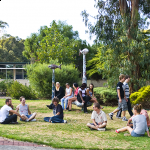What is the SACE?
The South Australian Certificate of Education (SACE) is an internationally recognised qualification that paves the way for young people to move from school to work or further training and study.
The SACE has been designed to meet the needs of students, families, higher and further education providers, employers and the community. The SACE helps students develop the skills and knowledge they need to succeed – whether they are headed for further education, training, an apprenticeship or straight into the workforce.
The certificate is based on two stages of achievement: Stage 1 (usually completed in Year 11) and Stage 2 (usually completed in Year 12).
Students who successfully complete the requirements are awarded the SACE certificate.
How do students get the SACE?
There are two stages in the SACE:
• Stage 1, which most students do in Year 11, except for the Personal Learning Plan, which most will do in Year 10.
• Stage 2, which most students do in Year 12.
Each subject or course successfully completed earns ‘credits’ towards the SACE, with a minimum of 200 Credits required for students to gain the certificate.
Students receive a grade from A to E for each subject at Stage 1, and from A+ to E– at Stage 2.
To achieve the SACE, students must complete the following compulsory requirements with a C grade or higher at Stage 1 and a C– or higher for Stage 2 requirements.
- Personal Learning Plan (10 Credits at Stage 1)
- Literacy – from a range of English subjects or courses (20 Credits at Stage 1 or Stage 2)
- Numeracy – from a range of Mathematics subjects or courses (10 Credits at Stage 1 or Stage 2)
- Research Project – an in-depth major project (10 Credits at Stage 2)
- Other Stage 2 subjects or courses totalling at least 60 Credits (subjects or VET certificates).
- The remaining credits may be completed using either Stage 1 / 2 / VET options.
Vocational Education and Training (VET) and the SACE
VET stands for Vocational Education and Training and gives students skills for work, particularly in the trades and industry. Students are able to build pathways in the SACE using VET. VET options in the SACE encourage students to complete, or make significant progress towards completing, VET qualifications while completing the SACE.
Students can earn 10 SACE Credits for successfully completing 70 hours of VET. The SACE Board determines whether the SACE Credits earned for a particular VET qualification will be recognised at Stage 1 or Stage 2.
Students can refer to the VET Recognition Register for more information about recognition of VET certificates at:







